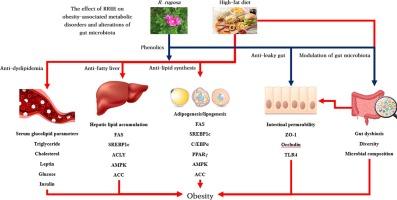Phenolic-enriched Rosa rugosa extract ameliorates obesity-associated metabolic disorders and regulates gut microbiota in high-fat diet-fed mice
IF 3.8
2区 农林科学
Q2 FOOD SCIENCE & TECHNOLOGY
引用次数: 0
Abstract
Obesity is a deleterious medical condition that can lead to lipid metabolism dysregulation and various metabolic disorders. The lipid-reducing and hypoglycemic effects of Rosa rugosa have been demonstrated both in vitro and in vivo. However, the mechanisms of the anti-obesity components and gut microbiota regulating potential of R. rugosa are not fully understood. Therefore, our study investigated the role of R. rugosa phenolic-enriched extract (RREE) in high-fat diet (HFD)-induced obesity and microbiome alterations. The results showed that RREE administration (300 mg/kg/day for 7 weeks) decreased body and organ weight by improving glucolipid metabolism and inhibiting lipid accumulation. Moreover, RREE restored gut permeability by regulating the expression levels of tight junction proteins and improving microbial composition and diversity. Taken together, the findings suggested the potential of RREE as a potent prebiotic agent that can ameliorate HFD-induced obesity and its associated metabolic disorders by regulating glucolipid metabolism and restoring the gut microbiota.

富含酚类的蔷薇提取物可改善肥胖相关的代谢紊乱,并调节高脂饮食喂养小鼠的肠道微生物群
肥胖是一种有害的疾病,可导致脂质代谢失调和各种代谢紊乱。蔷薇的降脂和降血糖作用已在体外和体内得到证实。然而,蔷薇的抗肥胖成分和肠道微生物群调节潜力的机制尚未完全明了。因此,我们的研究调查了蔷薇酚类富集提取物(RREE)在高脂饮食(HFD)诱导的肥胖和微生物组改变中的作用。结果表明,RREE(300 毫克/千克/天,连续 7 周)通过改善糖脂代谢和抑制脂质积累,降低了体重和器官重量。此外,RREE 还能调节肠道紧密连接蛋白的表达水平,改善微生物的组成和多样性,从而恢复肠道的通透性。综上所述,研究结果表明,RREE 是一种有效的益生元制剂,可通过调节糖脂代谢和恢复肠道微生物群来改善高氟酸诱导的肥胖及其相关代谢紊乱。
本文章由计算机程序翻译,如有差异,请以英文原文为准。
求助全文
约1分钟内获得全文
求助全文
来源期刊

Journal of Functional Foods
FOOD SCIENCE & TECHNOLOGY-
CiteScore
9.60
自引率
1.80%
发文量
428
审稿时长
76 days
期刊介绍:
Journal of Functional Foods continues with the same aims and scope, editorial team, submission system and rigorous peer review. We give authors the possibility to publish their top-quality papers in a well-established leading journal in the food and nutrition fields. The Journal will keep its rigorous criteria to screen high impact research addressing relevant scientific topics and performed by sound methodologies.
The Journal of Functional Foods aims to bring together the results of fundamental and applied research into healthy foods and biologically active food ingredients.
The Journal is centered in the specific area at the boundaries among food technology, nutrition and health welcoming papers having a good interdisciplinary approach. The Journal will cover the fields of plant bioactives; dietary fibre, probiotics; functional lipids; bioactive peptides; vitamins, minerals and botanicals and other dietary supplements. Nutritional and technological aspects related to the development of functional foods and beverages are of core interest to the journal. Experimental works dealing with food digestion, bioavailability of food bioactives and on the mechanisms by which foods and their components are able to modulate physiological parameters connected with disease prevention are of particular interest as well as those dealing with personalized nutrition and nutritional needs in pathological subjects.
 求助内容:
求助内容: 应助结果提醒方式:
应助结果提醒方式:


